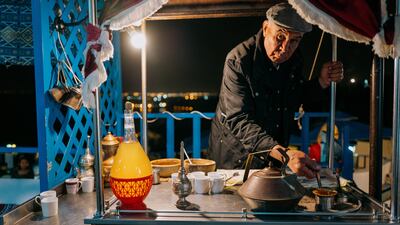Just after 9pm every night during Ramadan, crowds of people climb the steep hill that cuts through the sleepy seaside village of Sidi Bou Said to reach the terraced cafes overlooking the Gulf of Tunis.
Groups of young men, freshly caffeinated, sing jubilant fight songs for their local football clubs; parents with small children muscle prams over the slick cobblestones while their toddlers munch on fried doughnuts and older men relax at their favourite cafe tables under fragrant blossoming orange trees.
For the first time in three years, post-iftar nightlife has returned to Tunisia, and people of all ages are eager to soak it up.
"The last two years have been terrible," said Amar Yousef, who runs a shop selling vividly painted ceramics on the village's steep central road. "Between lockdowns during Ramadan and a lack of cruise ships and tourists, everyone – cafes, vendors, everyone – has barely scraped by."

In the early months of the pandemic in 2020, a near total lockdown of the country kept Tunisians indoors during the day and night, including during the holy month. By spring of 2021, despite waves of cases, much of daily life had returned to near normal and many hoped for a reprieve from the loneliness of celebrating in isolation.
But shortly before Ramadan began that year, the government issued an evening curfew that kept many from breaking the fast with friends and families – and caused the country's vibrant post-iftar nightlife to fizzle.
"People still found a way to see each other," said Meriam Hamadi , 28, who lives in the medina. "You just had to get creative. Lots of times it wasn't just iftar together, it was an afternoon cooking, then eating iftar and spending the night sleeping on a friend's couch."

But the country's cafes, many of which have their best month during Ramadan as families indulge in sweets, chicha and a day's worth of coffee or tea after sundown, suffered when people stayed indoors. Some closed altogether.
Although revellers have returned this year, many have less disposable income with which to indulge. An economic crisis gripping the country and squeezing the middle class particularly hard has only deepened since the start of the pandemic.
"The customers are back, but they aren't spending as much," said Amine, a waiter at a popular cafe in Sidi Bou Said. "People spend three hours at a table with just one coffee."
Despite the tighter budgets, Tunisians continue to revel in the return of Ramadan's late night social life.
At the crest of the hill in Sidi Bou Said, long queues formed around two tiny tiled food stalls selling bombaloni — fresh, deep-fried doughnuts coated in sugar or chocolate sauce for about 30 cents apiece. Men in tidy blue and white uniforms churn out thousands of the sweets each night for those looking for a treat on a budget.

Friends greeted each other with a jubilant "Lebes!" and kisses on the cheek while deftly holding their doughnuts aloft to avoid spilling sugar on each others' shoulders.
At Cafe des Delices, crowds packed on to the expansive terrace, as waiters flitted about delivering trays laden with coffee or fluted glass cups of assida zgougou, a black pine pudding that's a Ramadan delicacy. A group of girlfriends played the card game Uno at one table, while a couple enjoyed a romantic moment near by. Laughter drifted out into the night.
"It's just nice to have a chance to go out and see friends," said Noor Bouanani, 19. "You forget how lonely it was the last two Ramadans, and that's nice."


